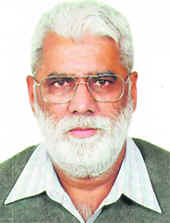|
Punjabi antenna
Wide and balanced coverage
Randeep Wadehra
|

Jatinder Pannu’s worldview has been shaped by real-life experiences as Kisan Sabha activist and journalist
|
It takes guts to
speak out when prudence demands silence. Not many can claim to
be forthright when it matters most. Jatinder Pannu — a
familiar face on Doordarshan, Jalandhar — belongs to that rare
species. During the days of terrorism his articles in various
newspapers highlighted brutalities perpetrated by terrorists and
security forces alike. On DDJ’s Khas Khabar Ik Nazar,
every Friday morning, he comes up with insightful, cogent
and pithy comments laced with rustic parables/anecdotes and wry
humour.
Interestingly, he
is neither a trained academician nor a conventional
intellectual. His worldview has been shaped by real-life
experiences as Kisan Sabha activist and journalist. Presently,
he is Assistant Editor with Nawan Zamana—apart from
acting as honorary editor for various publications and radio
stations abroad. He has represented the country at the United
Nations Human Rights Commission, Geneva.
Pannu has authored
six books, including satire Rang duniya de, poetry Ajj-Nama,
an analytical tome Sikh Dharam de Smajik Sarokar, apart
from books on terrorism and the Guru ka langar
controversy.
In 1992, Pannu was
awarded the National Media Award by the Small and Medium
Newspapers Association of India. In 2000 the Language Department
of Punjab honoured him with Shiromani Patarkar Award.
The recent Sant
Ramanand’s assassination-related violence, and the public
outrage over attacks on Indians in Australia have been dealt
with comprehensively by the various channels’ news bulletins
and talk shows like Khabarsaar & Ikk Khaas
Mulakaat (Zee Punjabi), Straight Talk and Masle(PTC
News) and Khas Khabar Ik Nazar (DDJ) etc.
While Sant
Ramanand’s funeral passed off peacefully—with our
politicians unabashedly playing politics even on such an
occasion—the talk shows came up with substantive mental
pabulum.
As for the racial
attacks in Australia, obviously the green-eyed monster has been
working overtime among the white supremacists there. The
consensus on talk shows was that the onus to protect the Indian
students Down Under lies squarely on the Australian Government
that has been encouraging our youth, through media and
educational agencies, to migrate to Oz. The Indian Government,
too, needs to do something more concrete than mere lodging of
formal protests.
Punjabi television’s
journalists have proved their mettle on several occasions.
Daljit Singh of PTC News has impressed with his intrepidity and
integrity. He has exposed corruption in high places,
bureaucratic indifference towards the exploited poor, and
general violation of laws by the empowered. The most recent was
catching on-camera policemen on duty drinking liquor in a PCR
van—small change by the journalist’s standards but effective
nevertheless.
Another journalist
from the channel, Rajesh Inderpal, has been campaigning against
environmental pollution in Ludhiana for quite some time now.
Last fortnight he reported how even the city’s posh localities
get sullage as drinking water. An official from Punjab’s
Pollution Control Board actually blushed on camera while
admitting that all the samples collected from posh colonies have
"failed miserably". Inderpal revealed how tubewells
remain unmanned; leaving them vulnerable to pollution and
mischief.
However, the same
channel is guilty of transgressing the proverbial Lakshman
Rekha. Its Jalandhar correspondent and TV crew showed a
young couple being thrashed by a group of women. The allegation
was that the man, a father of two, was living with another
woman. The onscreen violence against the young couple raged on
— thanks to the presence of media. It did not occur to anyone
that this was a patently illegal act. If media-inspired ‘justice’
is going to subvert the due processes of law, we will have chaos
of humongous proportions at our hands, resulting in kangaroo
courts. Do we want this?

|